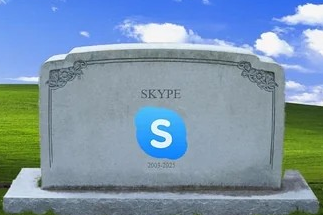Skype, one of the pioneers of voice over internet protocol (VoIP) calling and messaging, was an icon of modern communication technology when it launched in 2003.
From dominating the market with hundreds of millions of users, the pioneering Voice over Internet Protocol (VoIP) calling and messaging application Skype will officially stop operating from May 2025, marking the end of an era for the application that revolutionized online connectivity.
Skype, one of the pioneers of voice over internet (VoIP) calling and messaging applications, was once a symbol of modern communication technology when it launched in 2003. Once dominating the market with hundreds of millions of users, Skype has now lost its position to competitors such as Zoom, Google Meet and Microsoft Teams.
The most popular app worldwide
Skype was founded in 2003 by Niklas Zennström and Janus Friis, with technical support from an Estonian development team. The application uses peer-to-peer technology, allowing users to make free calls over the Internet without the need for a central server, a breakthrough at the time.

"Skype has revolutionized communication by leveraging P2P technology to provide free VoIP services, something that traditional telecom companies cannot compete with," said technology analyst Benedict Evans.
In 2005, eBay acquired Skype for $2.6 billion, but the deal failed to live up to expectations due to a lack of a clear integration strategy and application rollout. Ultimately, in 2009, eBay sold a majority stake to a group of investors.
By 2011, Skype had recorded more than 600 million registered users, becoming one of the most popular VoIP applications globally. This period marked the strong development of Skype thanks to its free calling feature and wide connectivity.
That same year, Microsoft acquired Skype for $8.5 billion, taking the app to the next level. Microsoft integrated Skype into its product ecosystem, from Xbox to Outlook to business tools, expanding its user base.
Microsoft CEO Satya Nadella once shared: "Skype has become an indispensable part of Microsoft's communication strategy, especially in connecting individual users and businesses."
Not keeping up with user trends
In 2013, Skype reached over 300 million monthly active users. The app introduced new features such as group video calling, screen sharing, and real-time translation, targeting both individual and business users.
In 2015, Microsoft launched Skype for Business, competing directly with professional video conferencing solutions.
During this period, Skype became not only a personal communication tool but also a powerful enterprise solution, affirming its leading position in the VoIP field.
However, since 2015, the application has started to lose market share due to the rise of applications such as Zoom, Google Meet, WhatsApp and Microsoft Teams. Especially during the COVID-19 pandemic, when the demand for online meetings skyrocketed, Skype no longer held the top position.
According to Statista, in 2021, Skype only had a 7% share of the video conferencing market in the UK, losing most of its market share to Zoom and Microsoft Teams.
One of the main reasons is that Skype's competitors are vastly superior in their ability to support large-scale meetings – a key factor during the pandemic.
"We focus on a seamless and easy-to-use video conferencing experience, something Skype has failed to deliver in recent years," Zoom CEO Eric Yuan said.
A 2019 study also found that Skype is frequently criticized for poor call quality, high latency, and a complex interface. According to IDC, modern users demand features like voice recording, document sharing, and collaboration tools—features that Skype has been slower to adopt than competitors like Zoom and Teams.
In addition, we must also mention Microsoft's strategic shift when the corporation focused on investing in Microsoft Teams, a superior integrated application, making Skype even more obscure.

Source: https://vietnamnet.vn/ung-dung-skype-tu-bieu-tuong-tien-phong-den-con-duong-khai-tu-2380755.html






























































![[Maritime News] More than 80% of global container shipping capacity is in the hands of MSC and major shipping alliances](https://vphoto.vietnam.vn/thumb/402x226/vietnam/resource/IMAGE/2025/7/16/6b4d586c984b4cbf8c5680352b9eaeb0)





































Comment (0)